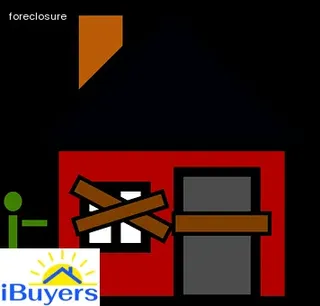Foreclosure is a legal process that lenders use to take possession of a home when the homeowner fails to keep up with their mortgage payments. In California, lenders can begin the foreclosure process by recording a Notice of Default in the county where the property is located.
This notice serves as an official warning that the homeowner has fallen behind on their payments and must either catch up or risk losing their home. After a certain amount of time has passed with no payment received, lenders then file a Notice of Trustee's Sale, which officially begins the foreclosure process.
During this period, homeowners have an opportunity to make good on their debt in order to save their home. If no payment is received before the sale date listed in the notice, then lenders will auction off the property and typically reclaim it as their own if nobody else bids on it.
It's important for California homeowners to understand these laws and processes so they can act quickly if they are ever faced with foreclosure.

In California, there are typically two types of foreclosure proceedings: Judicial and Non-Judicial. Judicial foreclosures require a court action to be initiated by the lender.
This means that a lawsuit is filed in the superior court of the county in which the property is located. The homeowner then has 20 days to respond to the complaint or they will lose by default.
In contrast, a non-judicial foreclosure does not require a court action and can proceed more quickly than a judicial foreclosure. In this type of foreclosure, the lender must still follow all state laws regarding notices and timelines; however, they do not need to go through the courts.
Both types of foreclosures allow lenders to take back possession of a property from a homeowner who has failed to make payments on their mortgage loan. As such, it’s important for homeowners in California to understand both types of foreclosure proceedings and their respective laws so that they can avoid losing their home.
When facing foreclosure, homeowners in California have a few options available to them that can help avoid losing their home. Pre-foreclosure options may include negotiating a repayment plan with the lender, obtaining a loan modification, or working with a short sale agent.
A repayment plan is an arrangement between the homeowner and the lender to pay off past due amounts and bring the loan current over time. Loan modification involves renegotiating the terms of the loan in order to make monthly payments more affordable for the homeowner.
A short sale agent helps negotiate with lenders to allow homeowners to sell their property for less than what is owed on it and still have their debt forgiven. Regardless of which option a homeowner chooses, it is important to understand all foreclosure laws and regulations in California before taking action.
With some research and preparation, homeowners can take steps to protect themselves from foreclosure and keep their homes safe.

The foreclosure process in California can be a daunting and confusing process for homeowners. It is important to understand the laws, timelines, and options available to you if you find yourself at risk of losing your home. The first step is to familiarize yourself with the timeline of the foreclosure process.
In California, lenders must provide a written Notice of Default (NOD) before they can move forward with foreclosure proceedings. This notice gives borrowers an opportunity to catch up on their payments or take other measures to save their home. After receiving this notice, homeowners have 90 days to become current on their mortgage before the lender can move forward with a Notice of Sale (NOS).
Furthermore, homeowners have the right to request mediation prior to the NOS being issued. Mediation allows homeowners and lenders to work out an alternate payment schedule or other arrangements that could help avoid foreclosure. Homeowners also have legal protections that can help them keep their homes, such as a Right To Cure or Redemption Periods.
Lastly, it is important for homeowners facing foreclosure to find assistance from counselors and organizations that specialize in helping people navigate these complex laws and processes. By understanding these timelines and laws, you can take steps towards protecting your rights as a homeowner and potentially save your home from foreclosure.
Stopping a foreclosure in California can be daunting, but with the right knowledge and resources, it is possible. The first step is to understand the entire foreclosure process and related laws.
It is important to research the timeline of events that will lead up to the potential sale of your home and any rights you may have throughout that process. During this time, it is important to understand your mortgage documents and review them for accuracy.
If you are struggling to make payments, contact your lender as soon as possible and explore options such as loan modifications or repayment plans. Additionally, there are other resources available such as counseling services or legal aid that can help provide assistance in navigating the foreclosure process.
Lastly, stay informed by attending local seminars or visiting government websites in order to fully understand how the foreclosure process works in California and how best to protect yourself from losing your home.

In California, if the proceeds from a foreclosure sale are not enough to cover the total amount of the loan, the lender or trustee may be able to pursue a deficiency judgment against the borrower. A deficiency judgment is a legal document that states how much money the borrower owes after a foreclosure.
The borrower may be responsible for paying this remaining balance in full or in installments. In California, a lender must file a lawsuit in court within one year of the foreclosure sale in order to obtain a deficiency judgment.
If granted, the judge will set an amount that must be paid and determine whether it can be paid all at once or in monthly payments. It is important for borrowers to understand their rights as they relate to deficiency judgments so they can take steps to protect themselves and their assets during the foreclosure process.
Homeowners in California have certain rights when it comes to a foreclosure. The California legislature has established laws that protect borrowers from unfair practices by lenders and servicers during the foreclosure process.
Foreclosure laws vary from state to state and it is important for homeowners to understand the applicable laws in their particular state and how they can work to protect their home. In California, lenders must provide written notice of their intent to foreclose before initiating any legal proceedings.
The lender must also establish a fair and reasonable timeline for the homeowner to cure the default and reinstate the loan – this will depend on whether or not a judicial or nonjudicial foreclosure is being used. Homeowners also have the right to legal representation throughout the process, as well as access to potential government programs that may help them avoid foreclosure or make arrangements with their lender.
It is essential for homeowners in California facing foreclosure to be aware of these rights and protections under state law in order to safeguard themselves against potential unfair practices by lenders or servicers.

California's Homeowner Bill of Rights (HBOR) was enacted in 2012, and it has had a significant effect on the foreclosure process in the state. The law offers homeowners more protection by preventing dual tracking and requires lenders to provide borrowers with written notice before initiating foreclosure proceedings.
Additionally, HBOR prohibits loan servicers from foreclosing on a home while a loan modification application is still being reviewed. It also mandates that loan servicers have a single point of contact for borrowers who are having difficulty making their payments.
This provision ensures that borrowers will receive consistent communication and assistance throughout the entire foreclosure process. Furthermore, HBOR mandates that homeowners must be given an opportunity to attend mediation sessions prior to their home being sold at auction.
This gives homeowners an additional chance to avoid losing their home and work out an agreement with their lender that is beneficial for both parties. Understanding these provisions of HBOR can help California residents stay informed and better protect themselves against foreclosure.
It can be difficult and overwhelming to navigate the foreclosure process in California, but there are many free or low-cost services available to help you understand your options. Start by contacting a HUD-certified housing counseling agency; they can provide education and guidance on all aspects of the foreclosure process, as well as resources for finding alternative solutions such as loan modifications or refinancing.
Additionally, you may want to contact a consumer law attorney specializing in housing matters who can review the facts of your case and provide advice about possible legal strategies. Your local county bar association or court clerk's office may also be able to refer you to a lawyer who practices in this area.
Other helpful sources of information include the California Department of Housing and Community Development, which provides free foreclosure prevention workshops, the California Homeowner Bill of Rights website, and HUD’s website for details on foreclosure laws and rights in California. Furthermore, consider reaching out to your lender directly; they may be willing to negotiate terms that could prevent foreclosure or at least delay it until other options become available.

The foreclosure process in California typically follows a certain set of steps, and it is important for homeowners to understand these steps and the associated laws so that they can take the necessary steps to avoid losing their home. The first step is that the lender must file a notice of default (NOD) with the county recorder's office; this document notifies the borrower that they have failed to make payments on their loan as agreed upon and will soon proceed with foreclosure.
Once an NOD has been filed, there is usually a three-month waiting period before the lender can actually begin the foreclosure process. During this time, the borrower may be able to work out a payment plan or even refinance their loan, allowing them to stay in their home.
If those options are not available, then after three months, the lender will typically conduct an auction sale of the property. At this sale, interested parties can bid on the property; if no bids are received or if all bids fall short of what is owed on the loan, then most likely the property will go back to the lender who can decide whether or not to sell it directly.
Throughout this entire process it is important for homeowners to understand their rights under California law and make sure that those rights are protected throughout each step of foreclosure proceedings.
The short answer is, yes. In California, you may be able to delay or halt your foreclosure by applying for a loan modification with your lender.
A loan modification is when the terms of your existing mortgage are changed to make it more affordable. This could include reducing the interest rate, extending the length of the loan and/or lowering the principal amount owed.
Applying for a loan modification can help alleviate some of the financial strain associated with keeping up with mortgage payments. However, it’s important to understand that lenders are not obligated to allow loan modifications and that they have their own criteria for approving them.
Additionally, there are different types of modifications available under California law depending on what type of mortgage you have and how far along you are in the foreclosure process. Contacting a qualified attorney who specializes in foreclosure laws can help you determine what type of modification is available to you and provide guidance through the application process.

Once a property is sold at the foreclosure sale, the process will move quickly. The former owner of the property has no further legal rights over it and must vacate it immediately.
The new owner will receive a Certificate of Sale, which serves as proof that they are now the rightful owner of the property. The certificate also establishes that any debt remaining on the original loan has been eliminated.
California law requires that creditors wait three months after the sale date before filing for a deficiency judgment against the former homeowner. This gives them time to explore other options to recoup their losses, such as suing for a deficiency judgment or taking legal action to collect late fees and other charges related to the mortgage loan.
Depending on how long it takes for the new owner to obtain possession of the property, he or she may be able to begin making payments on their own loan within one month of foreclosure. After that point, all payments will go directly to them and not through an escrow account held by lenders or banks.
When deciding whether or not to let your house go into foreclosure in California, there are a few factors to consider. It is important to understand the foreclosure process and laws in California so that you can make an informed decision and avoid losing your home.
Foreclosure is a process where the lender takes possession of the property and sells it in order to repay the delinquent debt owed by the homeowner. In California, foreclosure must be done through court proceedings, with specific rules that must be followed by both parties.
Additionally, it is important to consider any alternatives available for avoiding foreclosure such as loan modification or repayment plans that may have lower interest rates. Finally, if you are considering bankruptcy as a way to avoid foreclosure, it is important to know that filing for bankruptcy will remain on your credit report for up to 10 years and could adversely affect your ability to obtain credit in the future.
Taking all these factors into consideration and understanding the foreclosure process and laws in California can help you decide whether or not letting your house go into foreclosure is right for you.

It can be frightening to think about the prospect of foreclosure, but it's important to understand the process and laws in California to protect yourself from potential scammers. California law requires lenders to give borrowers a written notice of default at least 30 days before filing a Notice of Sale with the county recorder.
This document outlines what must be done to keep your home, such as paying all past due amounts, and gives you an opportunity to contact the lender or get legal help. If you receive any documents that appear suspicious, do not sign them without consulting a housing counselor or attorney first.
Additionally, if someone contacts you claiming they can help stop the foreclosure process for an upfront fee, beware! It is illegal for anyone other than your lender or attorney to charge for such services. Research any company or individual before agreeing to work with them and never send money without receiving something in writing, such as a contract outlining their services and fees.
Foreclosure scams can be avoided if you educate yourself on the laws and are diligent about protecting yourself from dishonest individuals.
Californians facing the challenge of foreclosure may be uncertain about what resources are available to learn more about the process. To help homeowners understand their rights and obligations, there are a variety of resources that may provide assistance.
State and federal agencies such as the California Department of Housing and Community Development offer information on how to prevent foreclosure through counseling services, mortgage modifications, and refinancing options. Homeowners may also benefit from consulting with an attorney who specializes in foreclosure law as well as attending free workshops hosted by nonprofit organizations.
Many of these programs provide helpful advice on how to work effectively with lenders in order to find a successful resolution. Additionally, online resources can be invaluable for understanding the laws related to foreclosure in California, allowing individuals to gain a better grasp of their legal rights during this difficult process.

Although it can be difficult to accept, there are situations where a homeowner in California may ultimately lose their house to a bank sale. Fortunately, state law provides certain options that may offer the opportunity for redemption and reinstatement of ownership after the property has been sold.
These rights vary depending on the type of loan and whether or not the loan was secured by a deed of trust. For instance, when a loan is secured by a deed of trust rather than a mortgage, the lender must serve an appropriate notice before foreclosing on the home.
As such, homeowners who have received this notice have additional time to decide if they wish to seek an alternative path such as payment arrangements with their lender or options to refinance their debt in order to avoid foreclosure. If these avenues fail and foreclosure is imminent, homeowners may still be allowed certain post-foreclosure rights including redemption and reinstatement.
Specifically, redemption allows homeowners up to three months after foreclosure to submit payment equivalent to 110% of the sale price plus any costs associated with foreclosure so as to regain ownership of their home. Similarly, reinstatement permits homeowners up to five days prior to the sale date for repayment of all amounts due on the loan which would result in cancellation of the foreclosure sale.
With both redemption and reinstatement offering potential solutions for those facing foreclosure, it is important for Californian homeowners who are struggling with debt related issues to understand their legal rights before making any decisions about losing their home.
When a home is lost to a bank sale in California, it's important to understand the timeline involved in the foreclosure process and laws so you can plan accordingly. Depending on the situation, you may have anywhere from 30-90 days to move out after a California home is lost to a bank sale.
During this time, homeowners should continue paying their mortgage until they receive official notice that the home has been sold. After the sale is officially processed, lenders will give written notice of eviction which must be followed immediately.
Homeowners should also be aware that they may be held responsible for any remaining balance on their mortgage loan even after eviction. As such, it's important to understand your rights and obligations before proceeding with a foreclosure.
By familiarizing yourself with the foreclosure process and laws in California, you can avoid losing your home and ensure that you remain in control of the situation.

Selling your house before the auction in California can affect the pre-foreclosure process. Many homeowners do this to avoid losing their property, but if not done correctly, it can still result in pre-foreclosure.
If you choose to sell your home before the auction, it is important to understand the foreclosure process and laws in California to ensure that you are making a well-informed decision. Additionally, there are potential tax implications for Californians who lose their homes through pre-foreclosure.
Not actively participating in the process may lead to serious negative consequences such as damage to a homeowner's credit score or even more costly legal fees if they are unable to pay off any remaining balance after selling the home. Understanding how selling your house before the auction affects the pre-foreclosure process and being aware of both potential benefits and drawbacks of this option will help Californians make smart decisions about their finances and avoid losing their homes.
Foreclosure is a process used by a lender to reclaim the property of an owner who has failed to make payments on their mortgage. In California, the foreclosure process can take anywhere from 90 days to more than a year depending on various factors.
Before foreclosure proceedings can begin, lenders must provide homeowners with clear notice and time for them to respond. This is typically referred to as pre-foreclosure and can last up to six months.
During this period, homeowners have options available to them such as loan modification or short sale which may help them avoid foreclosure altogether. If these efforts are unsuccessful, then the lender will issue a Notice of Default which officially begins the foreclosure process in California.
The Notice of Default gives homeowners up to three additional months to catch up on their loan payments before the house is sold at auction. Once the auction is complete, it can take another two or three months for all paperwork involved in the sale of the property to be finalized.
Understanding this timeline ahead of time can help homeowners prepare for potential foreclosure and take steps that may help prevent it from occurring in the first place.

In California, a foreclosure typically remains on your credit report for seven years. During this time, it can have a significant impact on your ability to borrow money and obtain certain kinds of insurance.
In order to avoid the possibility of having a foreclosure stay on your record, it is important to understand the foreclosure process and laws in California. Foreclosures are started when a homeowner fails to make payments on their mortgage or loan.
Once the lender files a notice of default, they must wait 90 days before filing a Notice of Trustee Sale with the county recorder. The Notice of Trustee Sale will provide details regarding the date and location where the home will be auctioned off to potential buyers.
After the sale has taken place, lenders must file a “Notice of Completion” which is sent to all parties involved in the sale. This notice also serves as confirmation that the property has been sold at auction.
It is important to remember that once a foreclosure has been completed, it will remain on your credit report for seven years unless you are able to work out an alternative solution with your lender prior to the completion of the foreclosure process. Understanding how long a foreclosure stays on your record in California can help you make informed decisions about protecting yourself from losing your home.
In California, the foreclosure process generally begins after a homeowner has missed three consecutive monthly payments. After this point, the lender is legally allowed to start taking action against the delinquent homeowner.
The lender typically sends out a notice of default that outlines how much needs to be paid to bring the loan current and how long they have to do it - usually between 30 and 90 days. If the homeowner fails to make up these payments within that time frame, then the lender can move forward with foreclosure proceedings.
Foreclosure is an emotional and difficult process for any family, so it's important for homeowners in California to understand their rights and stay informed on foreclosure laws throughout the entire process.
The downside of a foreclosure is severe for homeowners in California. Foreclosure can cause significant financial harm, damage your credit score, and reduce your ability to secure future financing.
It could also result in the loss of important assets like cars or even the home itself. In addition, foreclosures can have a major negative impact on the homeowner’s sense of security and self-esteem due to the embarrassment associated with it.
Because of this, it is important to understand the foreclosure process and laws in California to avoid losing your home to foreclosure and having to face these consequences.